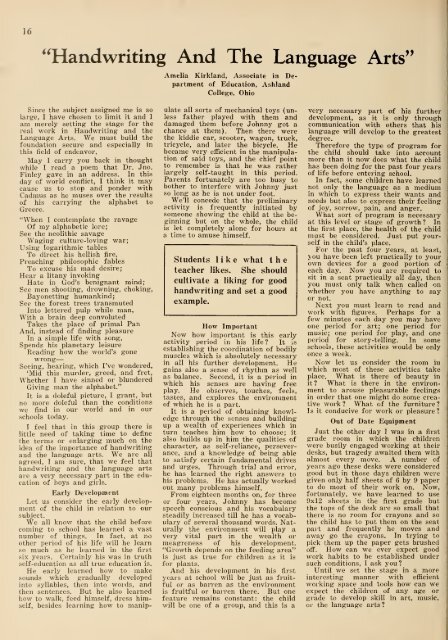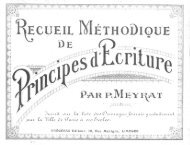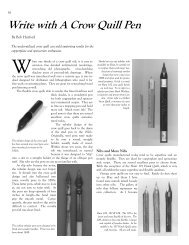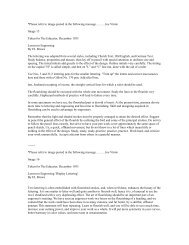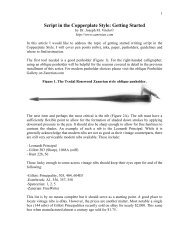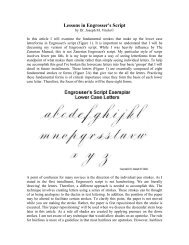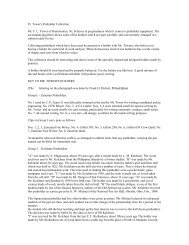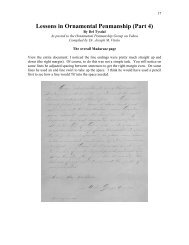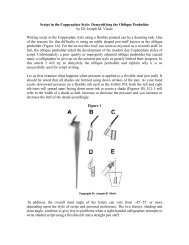The Educator (Volume 45) - IAMPETH
The Educator (Volume 45) - IAMPETH
The Educator (Volume 45) - IAMPETH
You also want an ePaper? Increase the reach of your titles
YUMPU automatically turns print PDFs into web optimized ePapers that Google loves.
16<br />
"Handwriting And <strong>The</strong> Language Arts''<br />
Since the subject assigned me is so<br />
large, I have chosen to limit it and I<br />
am merely setting the stage for the<br />
real work in Handwriting and the<br />
Language Arts. We must build the<br />
foundation secure and especially in<br />
this field of endeavor.<br />
May I carry you back in thought<br />
while I read a poem that Dr. Jno.<br />
Finley gave in an address. In this<br />
day of world conflict, I think it may<br />
cause us to stop and ponder with<br />
Cadmus as he muses over the results<br />
of his carrying the alphabet to<br />
Greece.<br />
"When I contemplate the ravage<br />
Of my alphabetic lore;<br />
See the neolithic savage<br />
Waging culture-loving war;<br />
Using logarithmic tables<br />
To direct his hellish fire,<br />
Preaching philosophic fables<br />
To excuse his mad desire;<br />
Hear a litany invoking<br />
Hate in God's benignant mind;<br />
See men shooting, drowning, choking,<br />
Bayonetting humankind;<br />
See the forest trees transmuted<br />
Into lettered pulp while man.<br />
With a brain deep convoluted<br />
Takes the place of primal Pan<br />
And, instead of finding pleasure<br />
In a simple life with song.<br />
Spends his planetary leisure<br />
Reading how the world's gone<br />
wrong<br />
—<br />
Seeing, hearing, which I've wondered,<br />
'Mid this murder, greed, and fret,<br />
Whether I have sinned or blundered<br />
Giving man the alphabet."<br />
It is a doleful picture, I grant, but<br />
no more doleful than the conditions<br />
we find in our world and in our<br />
schools today.<br />
I feel that in this group there is<br />
little need of taking time to define<br />
the terms or enlarging much on the<br />
idea of the importance of handwriting<br />
and the language arts. We are all<br />
agreed, I am sure, that we feel that<br />
handwriting and the language arts<br />
are a very necessary part in the education<br />
of boys and girls.<br />
Early Development<br />
Let us consider the early development<br />
of the child in relation to our<br />
subject.<br />
We all know that the child before<br />
coming to school has learned a vast<br />
number of things. In fact, at no<br />
other period of his life will he learn<br />
so much as he learned in the first<br />
six years. Certainly his was in truth<br />
self-education as all true education is.<br />
He early learned how to make<br />
sounds which gradually developed<br />
into syllables, then into words, and<br />
then sentences. But he also learned<br />
how to walk, feed himself, dress himself,<br />
besides learning how to manip-<br />
Amelia Kirkland, Associate in Department<br />
of Education, Ashland<br />
College, Ohio<br />
ulate all sorts of mechanical toys (unless<br />
father played with them and<br />
damaged them before Johnny got a<br />
chance at them). <strong>The</strong>n there were<br />
the kiddie car, scooter, wagon, truck,<br />
tricycle, and later the bicycle. He<br />
became very efficient in the manipulation<br />
of said toys, and the chief point<br />
to remember is that he was rather<br />
largely self-taught in this period.<br />
Parents fortunately are too busy to<br />
bother to interfere with Johnny just<br />
so long as he is not under foot.<br />
We'll concede that the preliminary<br />
activity is frequently initiated by<br />
someone showing the child at the beginning<br />
but on the whole, the child<br />
is let completely alone for hours at<br />
a time to amuse himself.<br />
Students like what the<br />
teacher ikes. She should |<br />
cultivate a liking for good<br />
handwriting and set a good<br />
example.<br />
How Important<br />
Now how important is this early<br />
activity period in his life? It is<br />
establishing the coordination of bodily<br />
muscles which is absolutely necessary<br />
in all his further development. He<br />
gains also a sense of rhythm as well<br />
as balance. Second, it is a period in<br />
which his senses are having free<br />
play. He observes, touches, feels,<br />
tastes, and explores the environment<br />
of which he is a part.<br />
It is a period of obtaining knowledge<br />
through the senses and building<br />
up a wealth of experiences which in<br />
turn teaches him how to choose; it<br />
also builds up in him the qualities of<br />
character, as self-reliance, perseverance,<br />
and a knowledge of being able<br />
to satisfy certain fundamental drives<br />
and urges. Through trial and error,<br />
he has learned the right answers to<br />
his problems. He has actually worked<br />
out many problems himself.<br />
Prom eighteen months on, for three<br />
or four years, Johnny has become<br />
speech conscious and his vocabulary<br />
steadily increased till he has a vocabulary<br />
of several thousand words. Naturally<br />
the environment will play a<br />
very vital part in the wealth or<br />
meagreness of his development.<br />
"Growth depends on the feeding area"<br />
is just as true for children as it is<br />
for plants.<br />
And his development in his first<br />
years at school will be just as fruitful<br />
or as barren as the environment<br />
is fruitful or barren there. But one<br />
feature remains constant: the child<br />
will be one of a group, and this is a<br />
very necessary part of his further<br />
development, as it is only through<br />
communication with others that his<br />
language will develop to the greatest<br />
degree.<br />
<strong>The</strong>refore the type of program for<br />
the child should take into account<br />
more than it now does what the child<br />
has been doing for the past four years<br />
of life before entering school.<br />
In fact, some children have learned<br />
not only the language as a medium<br />
in which to express their wants and<br />
needs but also to express their feeling<br />
of joy, sorrow, pain, and anger.<br />
What sort of program is necessary<br />
at this level or stage of growth ? In<br />
the first place, the health of the child<br />
must be considered. Just put yourself<br />
in the child's place.<br />
For the past four years, at least,<br />
you have been left practically to your<br />
own devices for a good portion of<br />
each day. Now you are required to<br />
sit in a seat practically all day, then<br />
you must only talk when called on<br />
whether you have anything to say<br />
or not.<br />
Next you must learn to read and<br />
work with figures. Perhaps for a<br />
few minutes each day you may have<br />
one period for art; one period foimusic;<br />
one period for play, and one<br />
period for story-telling. In some<br />
schools, these activities would be only<br />
once a week.<br />
Now let us consider the room in<br />
which most of these activities take<br />
place. What is there of beauty in<br />
it? What is there in the environment<br />
to arouse pleasurable feelings<br />
in order that one might do some creative<br />
work ? What of the furniture ?<br />
Is it conducive for work or pleasure ?<br />
Out of Date Equipment<br />
Just the other day I was in a first<br />
grade room in which the children<br />
were busily engaged working at their<br />
desks, but tragedy awaited them with<br />
almost every move. A number of<br />
years ago these desks were considered<br />
good but in those days children were<br />
given only half sheets of 6 by 9 paper<br />
to do most of their work on. Now,<br />
fortunately, we have leai'ned to use<br />
9x12 sheets in the first grade but<br />
the tops of the desk are so small that<br />
there is no room for crayons and so<br />
the child has to put them on the seat<br />
part and frequently he moves and<br />
away go the crayons. In trying to<br />
pick them up the paper gets brushed<br />
off. How can we ever expect good<br />
work habits to be established under<br />
such conditions, I ask you?<br />
Until we set the stage in a more<br />
interesting manner with efficient<br />
working space and tools how can we<br />
expect the children of any age or<br />
grade to develop skill in art, music,<br />
or the language arts ?


